Entrepreneurship and Small Businesses Management : assignment
VerifiedAdded on 2021/02/19
|16
|4681
|43
AI Summary
Contribute Materials
Your contribution can guide someone’s learning journey. Share your
documents today.

Entrepreneurship and
Small-Business
Management
Small-Business
Management
Secure Best Marks with AI Grader
Need help grading? Try our AI Grader for instant feedback on your assignments.
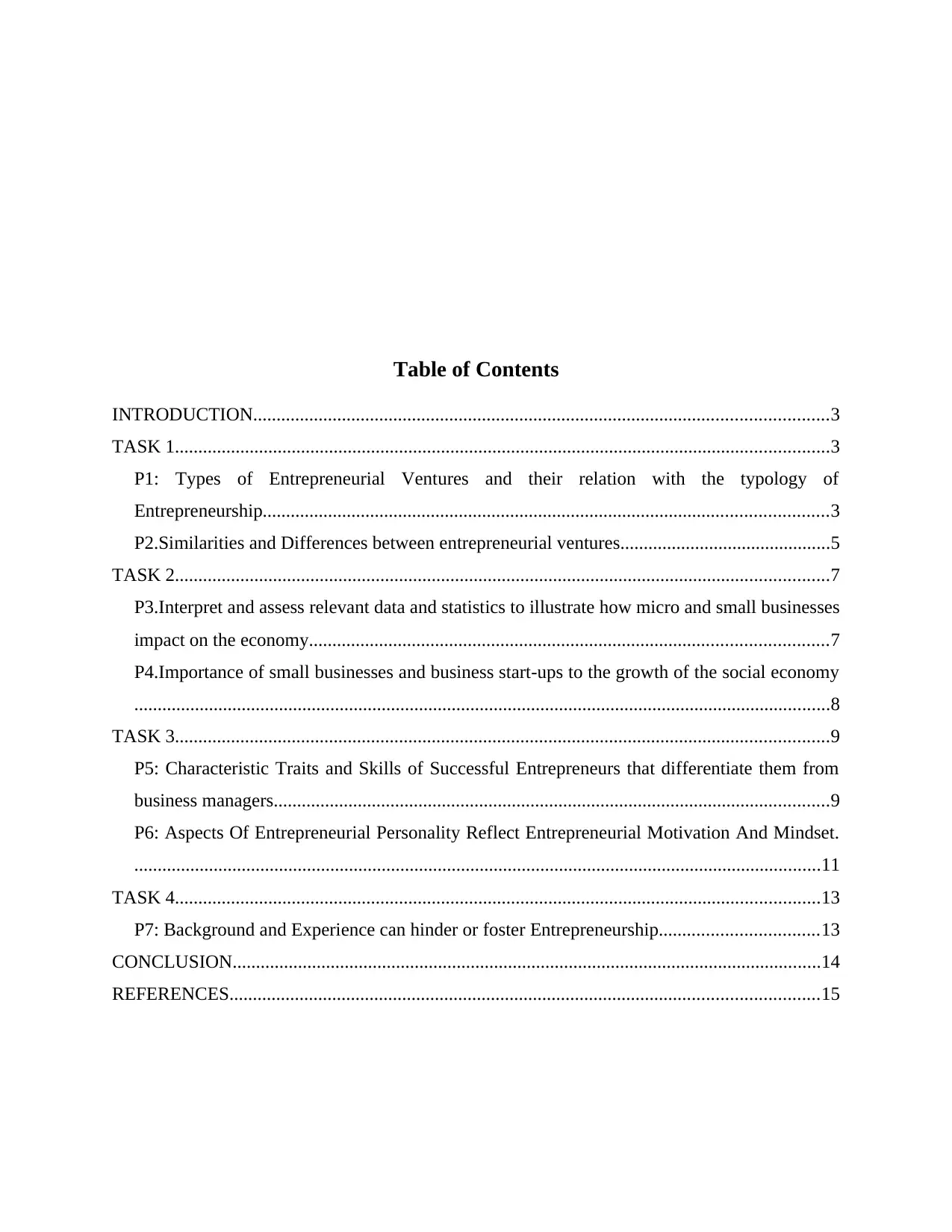
Table of Contents
INTRODUCTION...........................................................................................................................3
TASK 1............................................................................................................................................3
P1: Types of Entrepreneurial Ventures and their relation with the typology of
Entrepreneurship.........................................................................................................................3
P2.Similarities and Differences between entrepreneurial ventures.............................................5
TASK 2............................................................................................................................................7
P3.Interpret and assess relevant data and statistics to illustrate how micro and small businesses
impact on the economy...............................................................................................................7
P4.Importance of small businesses and business start-ups to the growth of the social economy
.....................................................................................................................................................8
TASK 3............................................................................................................................................9
P5: Characteristic Traits and Skills of Successful Entrepreneurs that differentiate them from
business managers.......................................................................................................................9
P6: Aspects Of Entrepreneurial Personality Reflect Entrepreneurial Motivation And Mindset.
...................................................................................................................................................11
TASK 4..........................................................................................................................................13
P7: Background and Experience can hinder or foster Entrepreneurship..................................13
CONCLUSION..............................................................................................................................14
REFERENCES..............................................................................................................................15
INTRODUCTION...........................................................................................................................3
TASK 1............................................................................................................................................3
P1: Types of Entrepreneurial Ventures and their relation with the typology of
Entrepreneurship.........................................................................................................................3
P2.Similarities and Differences between entrepreneurial ventures.............................................5
TASK 2............................................................................................................................................7
P3.Interpret and assess relevant data and statistics to illustrate how micro and small businesses
impact on the economy...............................................................................................................7
P4.Importance of small businesses and business start-ups to the growth of the social economy
.....................................................................................................................................................8
TASK 3............................................................................................................................................9
P5: Characteristic Traits and Skills of Successful Entrepreneurs that differentiate them from
business managers.......................................................................................................................9
P6: Aspects Of Entrepreneurial Personality Reflect Entrepreneurial Motivation And Mindset.
...................................................................................................................................................11
TASK 4..........................................................................................................................................13
P7: Background and Experience can hinder or foster Entrepreneurship..................................13
CONCLUSION..............................................................................................................................14
REFERENCES..............................................................................................................................15
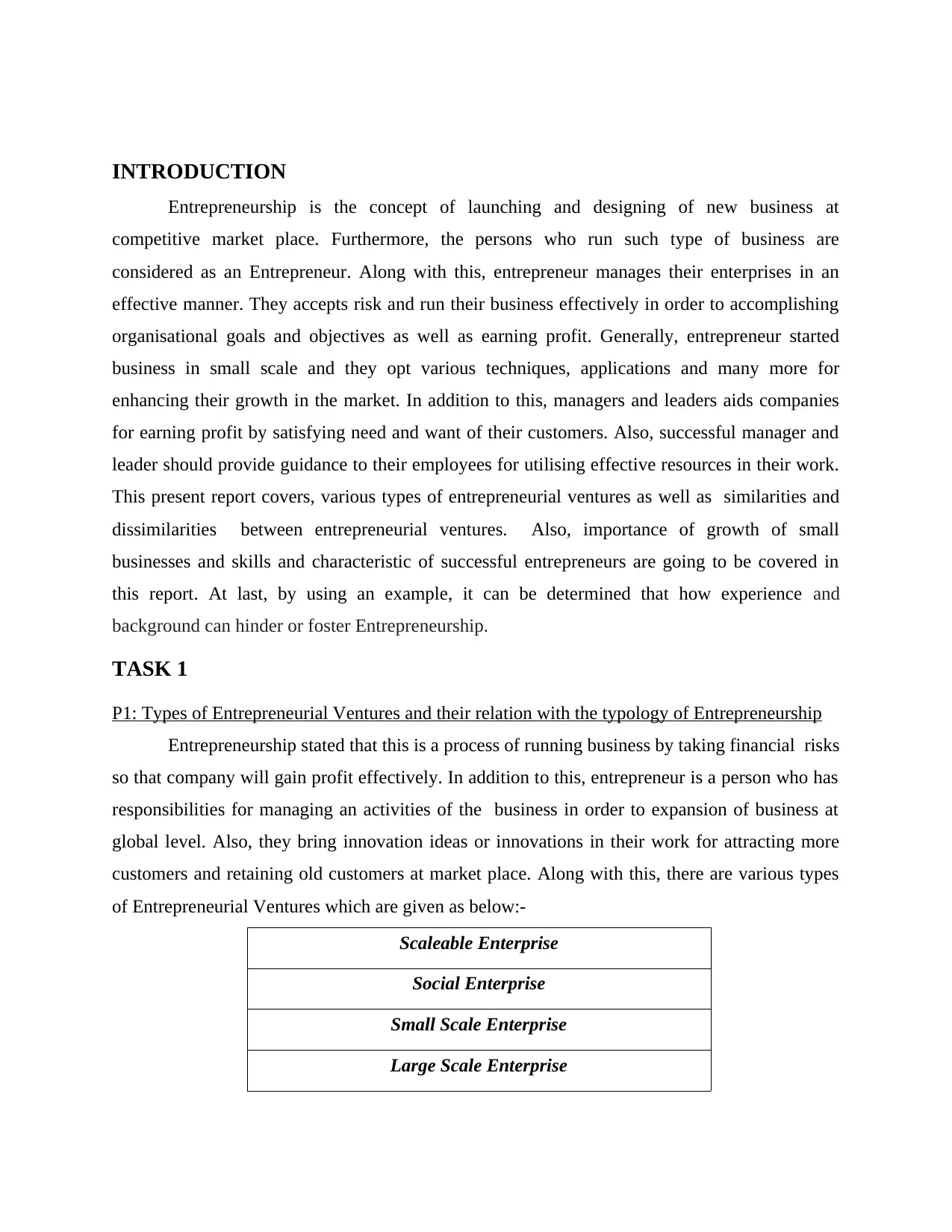
INTRODUCTION
Entrepreneurship is the concept of launching and designing of new business at
competitive market place. Furthermore, the persons who run such type of business are
considered as an Entrepreneur. Along with this, entrepreneur manages their enterprises in an
effective manner. They accepts risk and run their business effectively in order to accomplishing
organisational goals and objectives as well as earning profit. Generally, entrepreneur started
business in small scale and they opt various techniques, applications and many more for
enhancing their growth in the market. In addition to this, managers and leaders aids companies
for earning profit by satisfying need and want of their customers. Also, successful manager and
leader should provide guidance to their employees for utilising effective resources in their work.
This present report covers, various types of entrepreneurial ventures as well as similarities and
dissimilarities between entrepreneurial ventures. Also, importance of growth of small
businesses and skills and characteristic of successful entrepreneurs are going to be covered in
this report. At last, by using an example, it can be determined that how experience and
background can hinder or foster Entrepreneurship.
TASK 1
P1: Types of Entrepreneurial Ventures and their relation with the typology of Entrepreneurship
Entrepreneurship stated that this is a process of running business by taking financial risks
so that company will gain profit effectively. In addition to this, entrepreneur is a person who has
responsibilities for managing an activities of the business in order to expansion of business at
global level. Also, they bring innovation ideas or innovations in their work for attracting more
customers and retaining old customers at market place. Along with this, there are various types
of Entrepreneurial Ventures which are given as below:-
Scaleable Enterprise
Social Enterprise
Small Scale Enterprise
Large Scale Enterprise
Entrepreneurship is the concept of launching and designing of new business at
competitive market place. Furthermore, the persons who run such type of business are
considered as an Entrepreneur. Along with this, entrepreneur manages their enterprises in an
effective manner. They accepts risk and run their business effectively in order to accomplishing
organisational goals and objectives as well as earning profit. Generally, entrepreneur started
business in small scale and they opt various techniques, applications and many more for
enhancing their growth in the market. In addition to this, managers and leaders aids companies
for earning profit by satisfying need and want of their customers. Also, successful manager and
leader should provide guidance to their employees for utilising effective resources in their work.
This present report covers, various types of entrepreneurial ventures as well as similarities and
dissimilarities between entrepreneurial ventures. Also, importance of growth of small
businesses and skills and characteristic of successful entrepreneurs are going to be covered in
this report. At last, by using an example, it can be determined that how experience and
background can hinder or foster Entrepreneurship.
TASK 1
P1: Types of Entrepreneurial Ventures and their relation with the typology of Entrepreneurship
Entrepreneurship stated that this is a process of running business by taking financial risks
so that company will gain profit effectively. In addition to this, entrepreneur is a person who has
responsibilities for managing an activities of the business in order to expansion of business at
global level. Also, they bring innovation ideas or innovations in their work for attracting more
customers and retaining old customers at market place. Along with this, there are various types
of Entrepreneurial Ventures which are given as below:-
Scaleable Enterprise
Social Enterprise
Small Scale Enterprise
Large Scale Enterprise
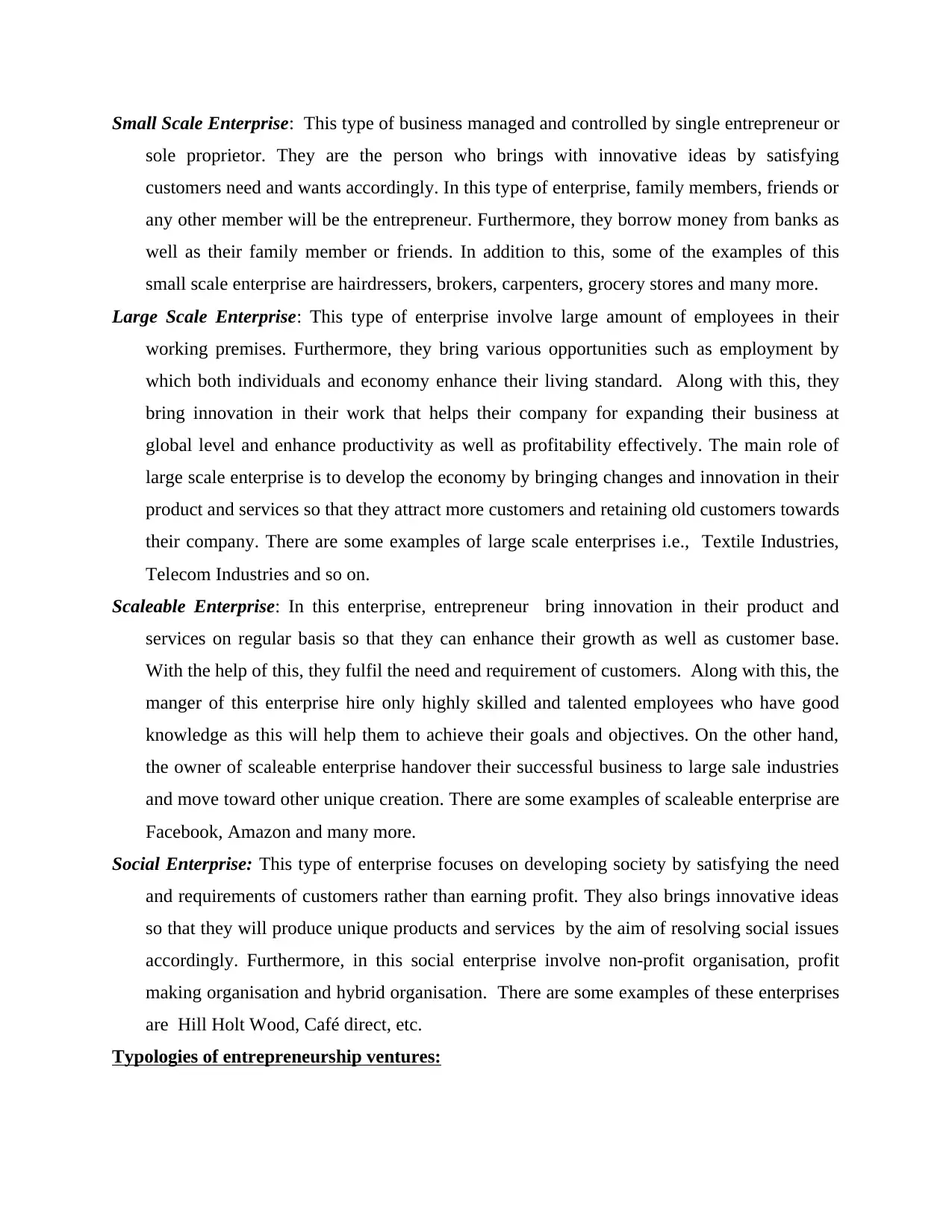
Small Scale Enterprise: This type of business managed and controlled by single entrepreneur or
sole proprietor. They are the person who brings with innovative ideas by satisfying
customers need and wants accordingly. In this type of enterprise, family members, friends or
any other member will be the entrepreneur. Furthermore, they borrow money from banks as
well as their family member or friends. In addition to this, some of the examples of this
small scale enterprise are hairdressers, brokers, carpenters, grocery stores and many more.
Large Scale Enterprise: This type of enterprise involve large amount of employees in their
working premises. Furthermore, they bring various opportunities such as employment by
which both individuals and economy enhance their living standard. Along with this, they
bring innovation in their work that helps their company for expanding their business at
global level and enhance productivity as well as profitability effectively. The main role of
large scale enterprise is to develop the economy by bringing changes and innovation in their
product and services so that they attract more customers and retaining old customers towards
their company. There are some examples of large scale enterprises i.e., Textile Industries,
Telecom Industries and so on.
Scaleable Enterprise: In this enterprise, entrepreneur bring innovation in their product and
services on regular basis so that they can enhance their growth as well as customer base.
With the help of this, they fulfil the need and requirement of customers. Along with this, the
manger of this enterprise hire only highly skilled and talented employees who have good
knowledge as this will help them to achieve their goals and objectives. On the other hand,
the owner of scaleable enterprise handover their successful business to large sale industries
and move toward other unique creation. There are some examples of scaleable enterprise are
Facebook, Amazon and many more.
Social Enterprise: This type of enterprise focuses on developing society by satisfying the need
and requirements of customers rather than earning profit. They also brings innovative ideas
so that they will produce unique products and services by the aim of resolving social issues
accordingly. Furthermore, in this social enterprise involve non-profit organisation, profit
making organisation and hybrid organisation. There are some examples of these enterprises
are Hill Holt Wood, Café direct, etc.
Typologies of entrepreneurship ventures:
sole proprietor. They are the person who brings with innovative ideas by satisfying
customers need and wants accordingly. In this type of enterprise, family members, friends or
any other member will be the entrepreneur. Furthermore, they borrow money from banks as
well as their family member or friends. In addition to this, some of the examples of this
small scale enterprise are hairdressers, brokers, carpenters, grocery stores and many more.
Large Scale Enterprise: This type of enterprise involve large amount of employees in their
working premises. Furthermore, they bring various opportunities such as employment by
which both individuals and economy enhance their living standard. Along with this, they
bring innovation in their work that helps their company for expanding their business at
global level and enhance productivity as well as profitability effectively. The main role of
large scale enterprise is to develop the economy by bringing changes and innovation in their
product and services so that they attract more customers and retaining old customers towards
their company. There are some examples of large scale enterprises i.e., Textile Industries,
Telecom Industries and so on.
Scaleable Enterprise: In this enterprise, entrepreneur bring innovation in their product and
services on regular basis so that they can enhance their growth as well as customer base.
With the help of this, they fulfil the need and requirement of customers. Along with this, the
manger of this enterprise hire only highly skilled and talented employees who have good
knowledge as this will help them to achieve their goals and objectives. On the other hand,
the owner of scaleable enterprise handover their successful business to large sale industries
and move toward other unique creation. There are some examples of scaleable enterprise are
Facebook, Amazon and many more.
Social Enterprise: This type of enterprise focuses on developing society by satisfying the need
and requirements of customers rather than earning profit. They also brings innovative ideas
so that they will produce unique products and services by the aim of resolving social issues
accordingly. Furthermore, in this social enterprise involve non-profit organisation, profit
making organisation and hybrid organisation. There are some examples of these enterprises
are Hill Holt Wood, Café direct, etc.
Typologies of entrepreneurship ventures:
Secure Best Marks with AI Grader
Need help grading? Try our AI Grader for instant feedback on your assignments.
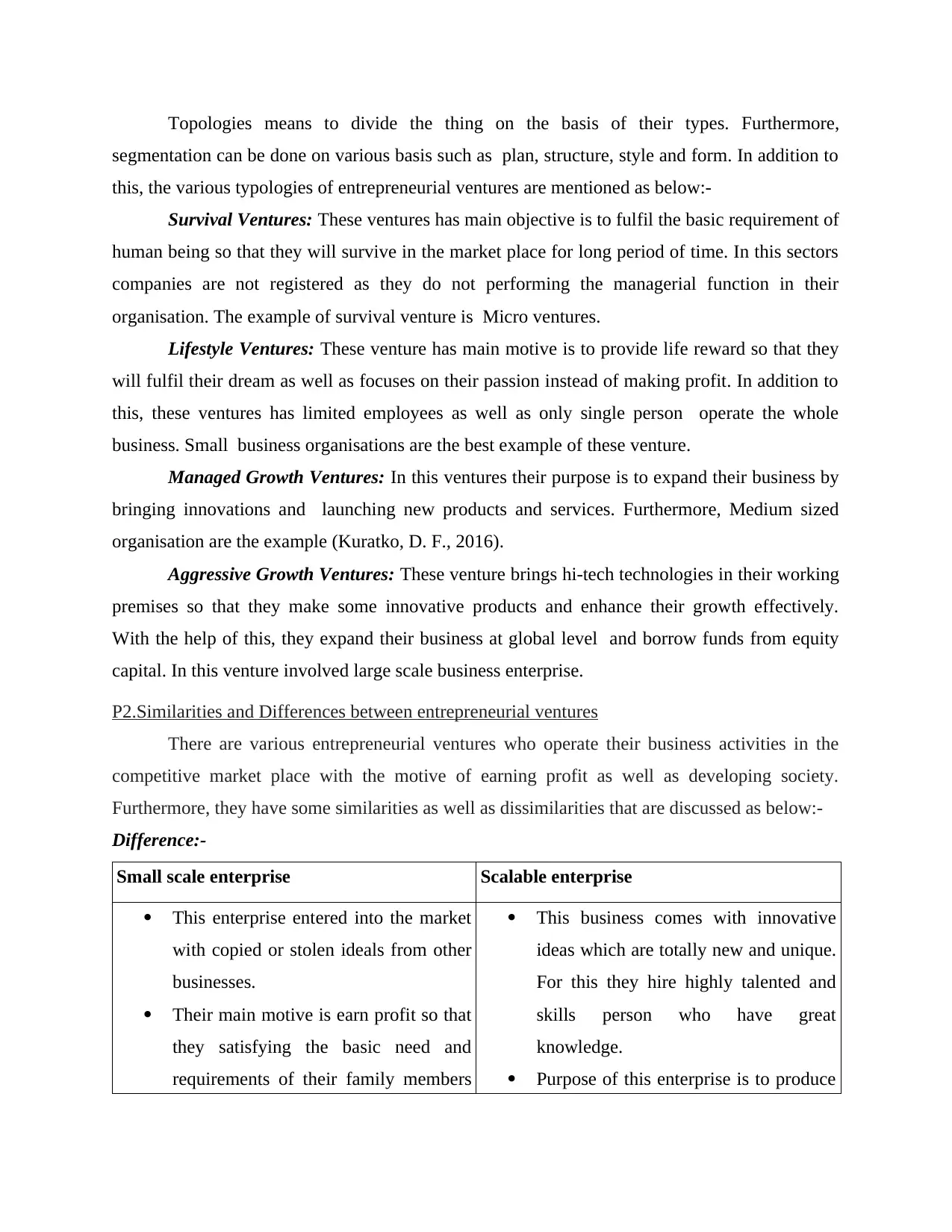
Topologies means to divide the thing on the basis of their types. Furthermore,
segmentation can be done on various basis such as plan, structure, style and form. In addition to
this, the various typologies of entrepreneurial ventures are mentioned as below:-
Survival Ventures: These ventures has main objective is to fulfil the basic requirement of
human being so that they will survive in the market place for long period of time. In this sectors
companies are not registered as they do not performing the managerial function in their
organisation. The example of survival venture is Micro ventures.
Lifestyle Ventures: These venture has main motive is to provide life reward so that they
will fulfil their dream as well as focuses on their passion instead of making profit. In addition to
this, these ventures has limited employees as well as only single person operate the whole
business. Small business organisations are the best example of these venture.
Managed Growth Ventures: In this ventures their purpose is to expand their business by
bringing innovations and launching new products and services. Furthermore, Medium sized
organisation are the example (Kuratko, D. F., 2016).
Aggressive Growth Ventures: These venture brings hi-tech technologies in their working
premises so that they make some innovative products and enhance their growth effectively.
With the help of this, they expand their business at global level and borrow funds from equity
capital. In this venture involved large scale business enterprise.
P2.Similarities and Differences between entrepreneurial ventures
There are various entrepreneurial ventures who operate their business activities in the
competitive market place with the motive of earning profit as well as developing society.
Furthermore, they have some similarities as well as dissimilarities that are discussed as below:-
Difference:-
Small scale enterprise Scalable enterprise
This enterprise entered into the market
with copied or stolen ideals from other
businesses.
Their main motive is earn profit so that
they satisfying the basic need and
requirements of their family members
This business comes with innovative
ideas which are totally new and unique.
For this they hire highly talented and
skills person who have great
knowledge.
Purpose of this enterprise is to produce
segmentation can be done on various basis such as plan, structure, style and form. In addition to
this, the various typologies of entrepreneurial ventures are mentioned as below:-
Survival Ventures: These ventures has main objective is to fulfil the basic requirement of
human being so that they will survive in the market place for long period of time. In this sectors
companies are not registered as they do not performing the managerial function in their
organisation. The example of survival venture is Micro ventures.
Lifestyle Ventures: These venture has main motive is to provide life reward so that they
will fulfil their dream as well as focuses on their passion instead of making profit. In addition to
this, these ventures has limited employees as well as only single person operate the whole
business. Small business organisations are the best example of these venture.
Managed Growth Ventures: In this ventures their purpose is to expand their business by
bringing innovations and launching new products and services. Furthermore, Medium sized
organisation are the example (Kuratko, D. F., 2016).
Aggressive Growth Ventures: These venture brings hi-tech technologies in their working
premises so that they make some innovative products and enhance their growth effectively.
With the help of this, they expand their business at global level and borrow funds from equity
capital. In this venture involved large scale business enterprise.
P2.Similarities and Differences between entrepreneurial ventures
There are various entrepreneurial ventures who operate their business activities in the
competitive market place with the motive of earning profit as well as developing society.
Furthermore, they have some similarities as well as dissimilarities that are discussed as below:-
Difference:-
Small scale enterprise Scalable enterprise
This enterprise entered into the market
with copied or stolen ideals from other
businesses.
Their main motive is earn profit so that
they satisfying the basic need and
requirements of their family members
This business comes with innovative
ideas which are totally new and unique.
For this they hire highly talented and
skills person who have great
knowledge.
Purpose of this enterprise is to produce
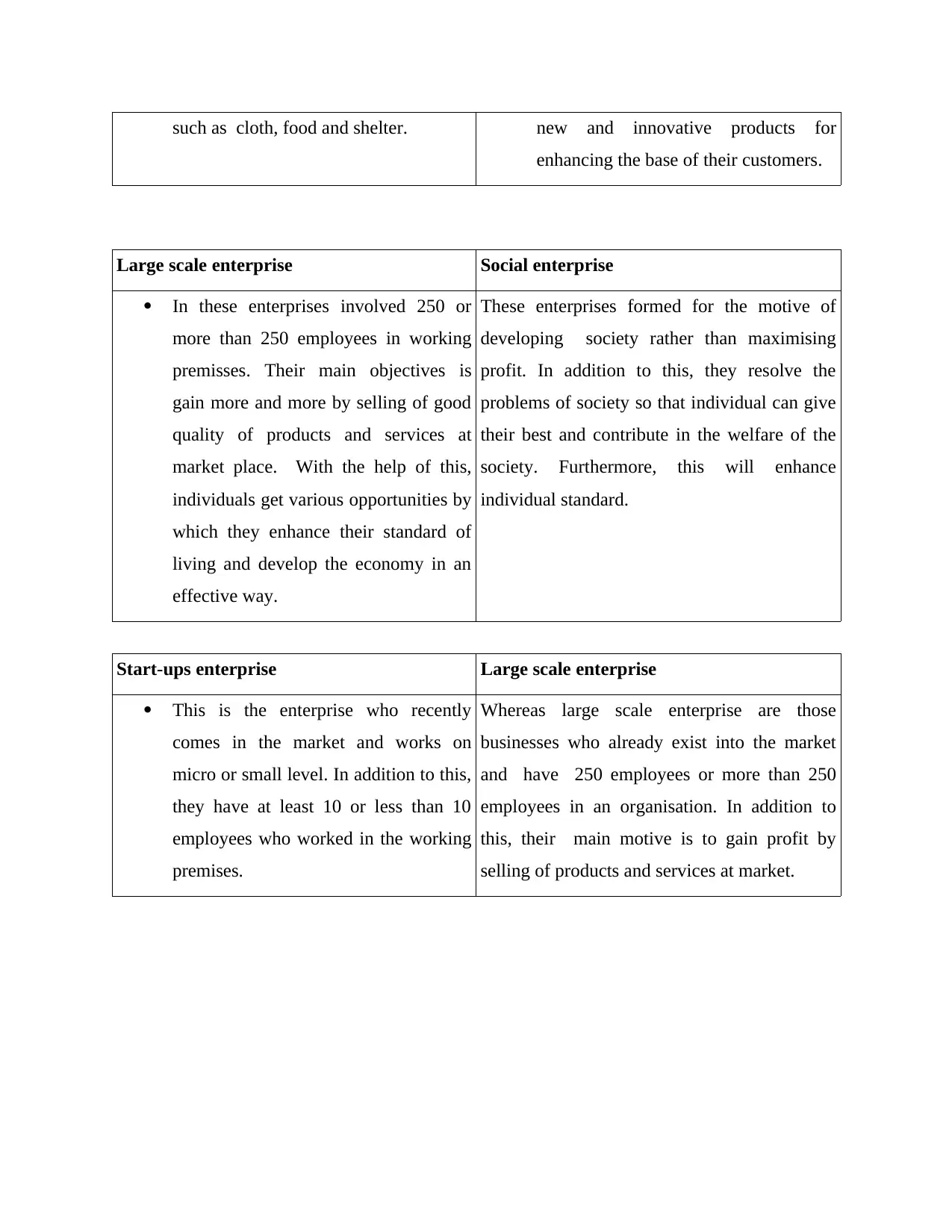
such as cloth, food and shelter. new and innovative products for
enhancing the base of their customers.
Large scale enterprise Social enterprise
In these enterprises involved 250 or
more than 250 employees in working
premisses. Their main objectives is
gain more and more by selling of good
quality of products and services at
market place. With the help of this,
individuals get various opportunities by
which they enhance their standard of
living and develop the economy in an
effective way.
These enterprises formed for the motive of
developing society rather than maximising
profit. In addition to this, they resolve the
problems of society so that individual can give
their best and contribute in the welfare of the
society. Furthermore, this will enhance
individual standard.
Start-ups enterprise Large scale enterprise
This is the enterprise who recently
comes in the market and works on
micro or small level. In addition to this,
they have at least 10 or less than 10
employees who worked in the working
premises.
Whereas large scale enterprise are those
businesses who already exist into the market
and have 250 employees or more than 250
employees in an organisation. In addition to
this, their main motive is to gain profit by
selling of products and services at market.
enhancing the base of their customers.
Large scale enterprise Social enterprise
In these enterprises involved 250 or
more than 250 employees in working
premisses. Their main objectives is
gain more and more by selling of good
quality of products and services at
market place. With the help of this,
individuals get various opportunities by
which they enhance their standard of
living and develop the economy in an
effective way.
These enterprises formed for the motive of
developing society rather than maximising
profit. In addition to this, they resolve the
problems of society so that individual can give
their best and contribute in the welfare of the
society. Furthermore, this will enhance
individual standard.
Start-ups enterprise Large scale enterprise
This is the enterprise who recently
comes in the market and works on
micro or small level. In addition to this,
they have at least 10 or less than 10
employees who worked in the working
premises.
Whereas large scale enterprise are those
businesses who already exist into the market
and have 250 employees or more than 250
employees in an organisation. In addition to
this, their main motive is to gain profit by
selling of products and services at market.
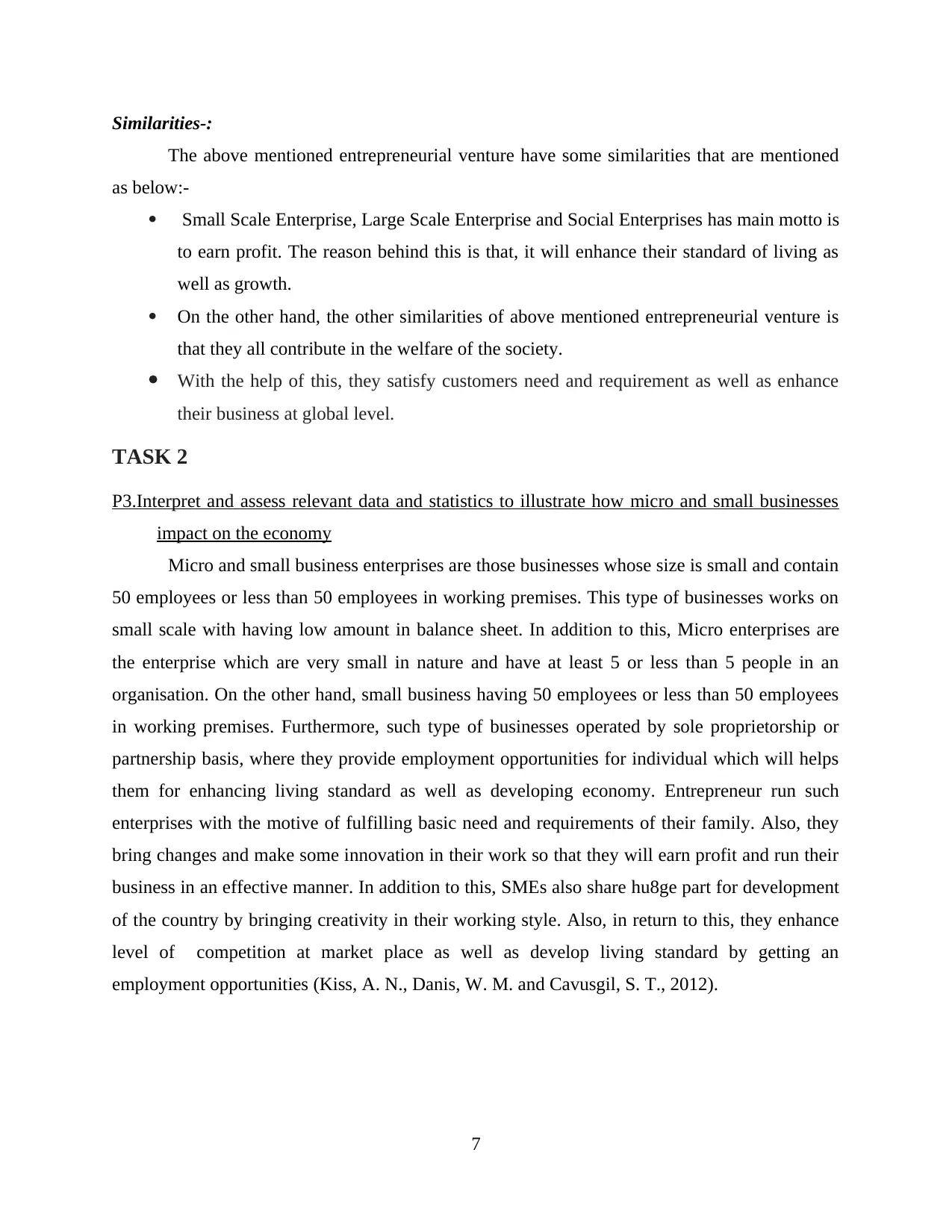
Similarities-:
The above mentioned entrepreneurial venture have some similarities that are mentioned
as below:-
Small Scale Enterprise, Large Scale Enterprise and Social Enterprises has main motto is
to earn profit. The reason behind this is that, it will enhance their standard of living as
well as growth.
On the other hand, the other similarities of above mentioned entrepreneurial venture is
that they all contribute in the welfare of the society.
With the help of this, they satisfy customers need and requirement as well as enhance
their business at global level.
TASK 2
P3.Interpret and assess relevant data and statistics to illustrate how micro and small businesses
impact on the economy
Micro and small business enterprises are those businesses whose size is small and contain
50 employees or less than 50 employees in working premises. This type of businesses works on
small scale with having low amount in balance sheet. In addition to this, Micro enterprises are
the enterprise which are very small in nature and have at least 5 or less than 5 people in an
organisation. On the other hand, small business having 50 employees or less than 50 employees
in working premises. Furthermore, such type of businesses operated by sole proprietorship or
partnership basis, where they provide employment opportunities for individual which will helps
them for enhancing living standard as well as developing economy. Entrepreneur run such
enterprises with the motive of fulfilling basic need and requirements of their family. Also, they
bring changes and make some innovation in their work so that they will earn profit and run their
business in an effective manner. In addition to this, SMEs also share hu8ge part for development
of the country by bringing creativity in their working style. Also, in return to this, they enhance
level of competition at market place as well as develop living standard by getting an
employment opportunities (Kiss, A. N., Danis, W. M. and Cavusgil, S. T., 2012).
7
The above mentioned entrepreneurial venture have some similarities that are mentioned
as below:-
Small Scale Enterprise, Large Scale Enterprise and Social Enterprises has main motto is
to earn profit. The reason behind this is that, it will enhance their standard of living as
well as growth.
On the other hand, the other similarities of above mentioned entrepreneurial venture is
that they all contribute in the welfare of the society.
With the help of this, they satisfy customers need and requirement as well as enhance
their business at global level.
TASK 2
P3.Interpret and assess relevant data and statistics to illustrate how micro and small businesses
impact on the economy
Micro and small business enterprises are those businesses whose size is small and contain
50 employees or less than 50 employees in working premises. This type of businesses works on
small scale with having low amount in balance sheet. In addition to this, Micro enterprises are
the enterprise which are very small in nature and have at least 5 or less than 5 people in an
organisation. On the other hand, small business having 50 employees or less than 50 employees
in working premises. Furthermore, such type of businesses operated by sole proprietorship or
partnership basis, where they provide employment opportunities for individual which will helps
them for enhancing living standard as well as developing economy. Entrepreneur run such
enterprises with the motive of fulfilling basic need and requirements of their family. Also, they
bring changes and make some innovation in their work so that they will earn profit and run their
business in an effective manner. In addition to this, SMEs also share hu8ge part for development
of the country by bringing creativity in their working style. Also, in return to this, they enhance
level of competition at market place as well as develop living standard by getting an
employment opportunities (Kiss, A. N., Danis, W. M. and Cavusgil, S. T., 2012).
7
Paraphrase This Document
Need a fresh take? Get an instant paraphrase of this document with our AI Paraphraser
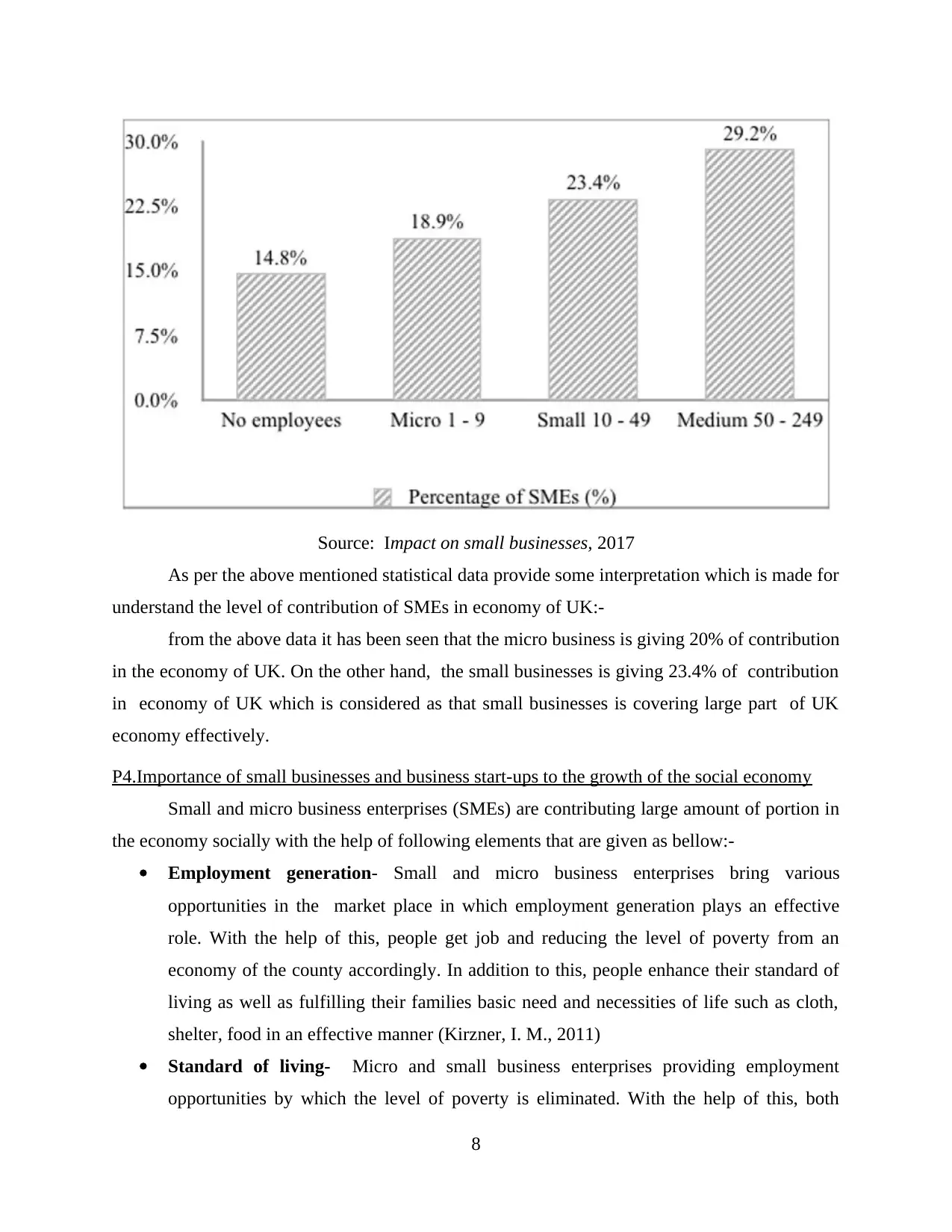
Source: Impact on small businesses, 2017
As per the above mentioned statistical data provide some interpretation which is made for
understand the level of contribution of SMEs in economy of UK:-
from the above data it has been seen that the micro business is giving 20% of contribution
in the economy of UK. On the other hand, the small businesses is giving 23.4% of contribution
in economy of UK which is considered as that small businesses is covering large part of UK
economy effectively.
P4.Importance of small businesses and business start-ups to the growth of the social economy
Small and micro business enterprises (SMEs) are contributing large amount of portion in
the economy socially with the help of following elements that are given as bellow:-
Employment generation- Small and micro business enterprises bring various
opportunities in the market place in which employment generation plays an effective
role. With the help of this, people get job and reducing the level of poverty from an
economy of the county accordingly. In addition to this, people enhance their standard of
living as well as fulfilling their families basic need and necessities of life such as cloth,
shelter, food in an effective manner (Kirzner, I. M., 2011)
Standard of living- Micro and small business enterprises providing employment
opportunities by which the level of poverty is eliminated. With the help of this, both
8
As per the above mentioned statistical data provide some interpretation which is made for
understand the level of contribution of SMEs in economy of UK:-
from the above data it has been seen that the micro business is giving 20% of contribution
in the economy of UK. On the other hand, the small businesses is giving 23.4% of contribution
in economy of UK which is considered as that small businesses is covering large part of UK
economy effectively.
P4.Importance of small businesses and business start-ups to the growth of the social economy
Small and micro business enterprises (SMEs) are contributing large amount of portion in
the economy socially with the help of following elements that are given as bellow:-
Employment generation- Small and micro business enterprises bring various
opportunities in the market place in which employment generation plays an effective
role. With the help of this, people get job and reducing the level of poverty from an
economy of the county accordingly. In addition to this, people enhance their standard of
living as well as fulfilling their families basic need and necessities of life such as cloth,
shelter, food in an effective manner (Kirzner, I. M., 2011)
Standard of living- Micro and small business enterprises providing employment
opportunities by which the level of poverty is eliminated. With the help of this, both
8
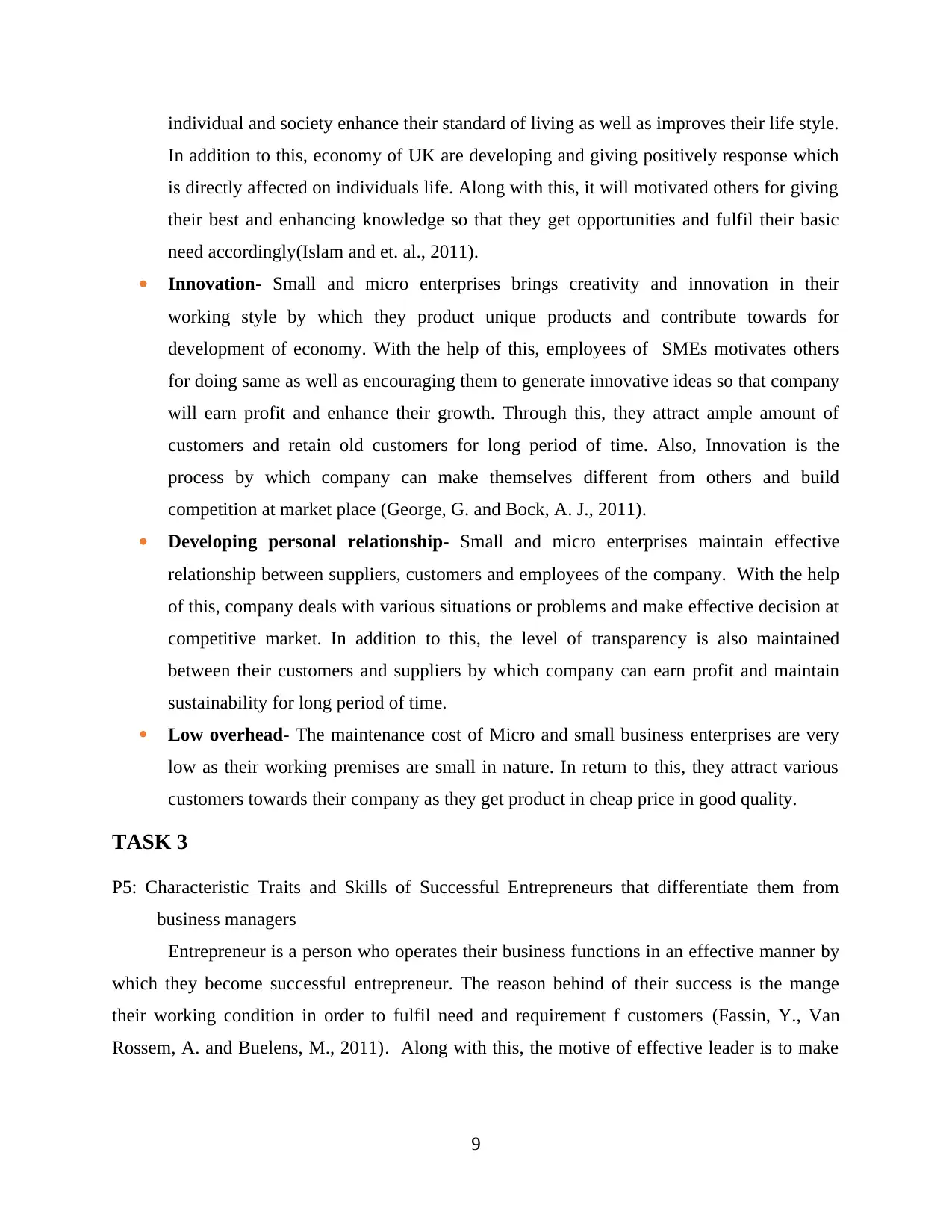
individual and society enhance their standard of living as well as improves their life style.
In addition to this, economy of UK are developing and giving positively response which
is directly affected on individuals life. Along with this, it will motivated others for giving
their best and enhancing knowledge so that they get opportunities and fulfil their basic
need accordingly(Islam and et. al., 2011).
Innovation- Small and micro enterprises brings creativity and innovation in their
working style by which they product unique products and contribute towards for
development of economy. With the help of this, employees of SMEs motivates others
for doing same as well as encouraging them to generate innovative ideas so that company
will earn profit and enhance their growth. Through this, they attract ample amount of
customers and retain old customers for long period of time. Also, Innovation is the
process by which company can make themselves different from others and build
competition at market place (George, G. and Bock, A. J., 2011).
Developing personal relationship- Small and micro enterprises maintain effective
relationship between suppliers, customers and employees of the company. With the help
of this, company deals with various situations or problems and make effective decision at
competitive market. In addition to this, the level of transparency is also maintained
between their customers and suppliers by which company can earn profit and maintain
sustainability for long period of time.
Low overhead- The maintenance cost of Micro and small business enterprises are very
low as their working premises are small in nature. In return to this, they attract various
customers towards their company as they get product in cheap price in good quality.
TASK 3
P5: Characteristic Traits and Skills of Successful Entrepreneurs that differentiate them from
business managers
Entrepreneur is a person who operates their business functions in an effective manner by
which they become successful entrepreneur. The reason behind of their success is the mange
their working condition in order to fulfil need and requirement f customers (Fassin, Y., Van
Rossem, A. and Buelens, M., 2011). Along with this, the motive of effective leader is to make
9
In addition to this, economy of UK are developing and giving positively response which
is directly affected on individuals life. Along with this, it will motivated others for giving
their best and enhancing knowledge so that they get opportunities and fulfil their basic
need accordingly(Islam and et. al., 2011).
Innovation- Small and micro enterprises brings creativity and innovation in their
working style by which they product unique products and contribute towards for
development of economy. With the help of this, employees of SMEs motivates others
for doing same as well as encouraging them to generate innovative ideas so that company
will earn profit and enhance their growth. Through this, they attract ample amount of
customers and retain old customers for long period of time. Also, Innovation is the
process by which company can make themselves different from others and build
competition at market place (George, G. and Bock, A. J., 2011).
Developing personal relationship- Small and micro enterprises maintain effective
relationship between suppliers, customers and employees of the company. With the help
of this, company deals with various situations or problems and make effective decision at
competitive market. In addition to this, the level of transparency is also maintained
between their customers and suppliers by which company can earn profit and maintain
sustainability for long period of time.
Low overhead- The maintenance cost of Micro and small business enterprises are very
low as their working premises are small in nature. In return to this, they attract various
customers towards their company as they get product in cheap price in good quality.
TASK 3
P5: Characteristic Traits and Skills of Successful Entrepreneurs that differentiate them from
business managers
Entrepreneur is a person who operates their business functions in an effective manner by
which they become successful entrepreneur. The reason behind of their success is the mange
their working condition in order to fulfil need and requirement f customers (Fassin, Y., Van
Rossem, A. and Buelens, M., 2011). Along with this, the motive of effective leader is to make
9
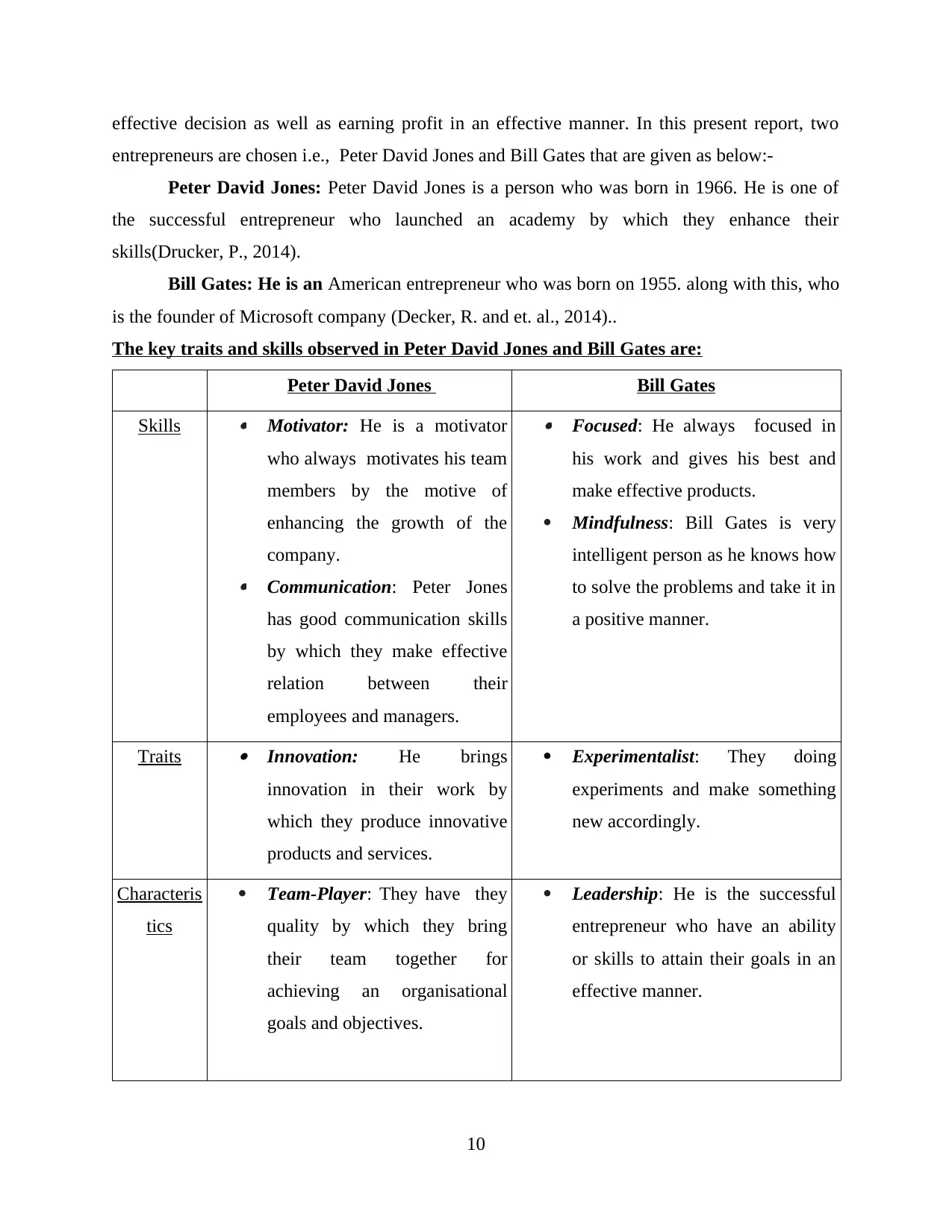
effective decision as well as earning profit in an effective manner. In this present report, two
entrepreneurs are chosen i.e., Peter David Jones and Bill Gates that are given as below:-
Peter David Jones: Peter David Jones is a person who was born in 1966. He is one of
the successful entrepreneur who launched an academy by which they enhance their
skills(Drucker, P., 2014).
Bill Gates: He is an American entrepreneur who was born on 1955. along with this, who
is the founder of Microsoft company (Decker, R. and et. al., 2014)..
The key traits and skills observed in Peter David Jones and Bill Gates are:
Peter David Jones Bill Gates
Skills
Motivator: He is a motivator
who always motivates his team
members by the motive of
enhancing the growth of the
company.
Communication: Peter Jones
has good communication skills
by which they make effective
relation between their
employees and managers.
Focused: He always focused in
his work and gives his best and
make effective products.
Mindfulness: Bill Gates is very
intelligent person as he knows how
to solve the problems and take it in
a positive manner.
Traits
Innovation: He brings
innovation in their work by
which they produce innovative
products and services.
Experimentalist: They doing
experiments and make something
new accordingly.
Characteris
tics
Team-Player: They have they
quality by which they bring
their team together for
achieving an organisational
goals and objectives.
Leadership: He is the successful
entrepreneur who have an ability
or skills to attain their goals in an
effective manner.
10
entrepreneurs are chosen i.e., Peter David Jones and Bill Gates that are given as below:-
Peter David Jones: Peter David Jones is a person who was born in 1966. He is one of
the successful entrepreneur who launched an academy by which they enhance their
skills(Drucker, P., 2014).
Bill Gates: He is an American entrepreneur who was born on 1955. along with this, who
is the founder of Microsoft company (Decker, R. and et. al., 2014)..
The key traits and skills observed in Peter David Jones and Bill Gates are:
Peter David Jones Bill Gates
Skills
Motivator: He is a motivator
who always motivates his team
members by the motive of
enhancing the growth of the
company.
Communication: Peter Jones
has good communication skills
by which they make effective
relation between their
employees and managers.
Focused: He always focused in
his work and gives his best and
make effective products.
Mindfulness: Bill Gates is very
intelligent person as he knows how
to solve the problems and take it in
a positive manner.
Traits
Innovation: He brings
innovation in their work by
which they produce innovative
products and services.
Experimentalist: They doing
experiments and make something
new accordingly.
Characteris
tics
Team-Player: They have they
quality by which they bring
their team together for
achieving an organisational
goals and objectives.
Leadership: He is the successful
entrepreneur who have an ability
or skills to attain their goals in an
effective manner.
10
Secure Best Marks with AI Grader
Need help grading? Try our AI Grader for instant feedback on your assignments.
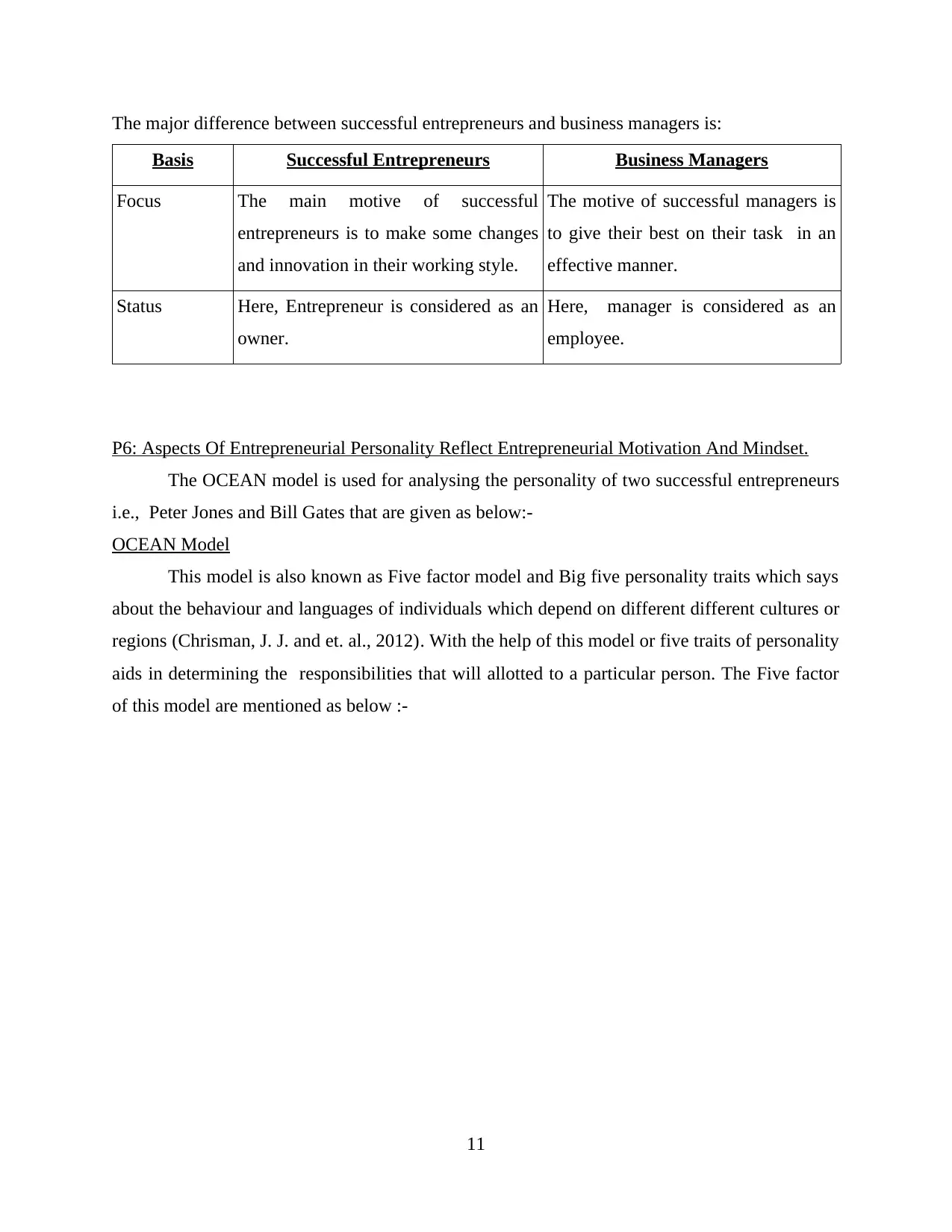
The major difference between successful entrepreneurs and business managers is:
Basis Successful Entrepreneurs Business Managers
Focus The main motive of successful
entrepreneurs is to make some changes
and innovation in their working style.
The motive of successful managers is
to give their best on their task in an
effective manner.
Status Here, Entrepreneur is considered as an
owner.
Here, manager is considered as an
employee.
P6: Aspects Of Entrepreneurial Personality Reflect Entrepreneurial Motivation And Mindset.
The OCEAN model is used for analysing the personality of two successful entrepreneurs
i.e., Peter Jones and Bill Gates that are given as below:-
OCEAN Model
This model is also known as Five factor model and Big five personality traits which says
about the behaviour and languages of individuals which depend on different different cultures or
regions (Chrisman, J. J. and et. al., 2012). With the help of this model or five traits of personality
aids in determining the responsibilities that will allotted to a particular person. The Five factor
of this model are mentioned as below :-
11
Basis Successful Entrepreneurs Business Managers
Focus The main motive of successful
entrepreneurs is to make some changes
and innovation in their working style.
The motive of successful managers is
to give their best on their task in an
effective manner.
Status Here, Entrepreneur is considered as an
owner.
Here, manager is considered as an
employee.
P6: Aspects Of Entrepreneurial Personality Reflect Entrepreneurial Motivation And Mindset.
The OCEAN model is used for analysing the personality of two successful entrepreneurs
i.e., Peter Jones and Bill Gates that are given as below:-
OCEAN Model
This model is also known as Five factor model and Big five personality traits which says
about the behaviour and languages of individuals which depend on different different cultures or
regions (Chrisman, J. J. and et. al., 2012). With the help of this model or five traits of personality
aids in determining the responsibilities that will allotted to a particular person. The Five factor
of this model are mentioned as below :-
11
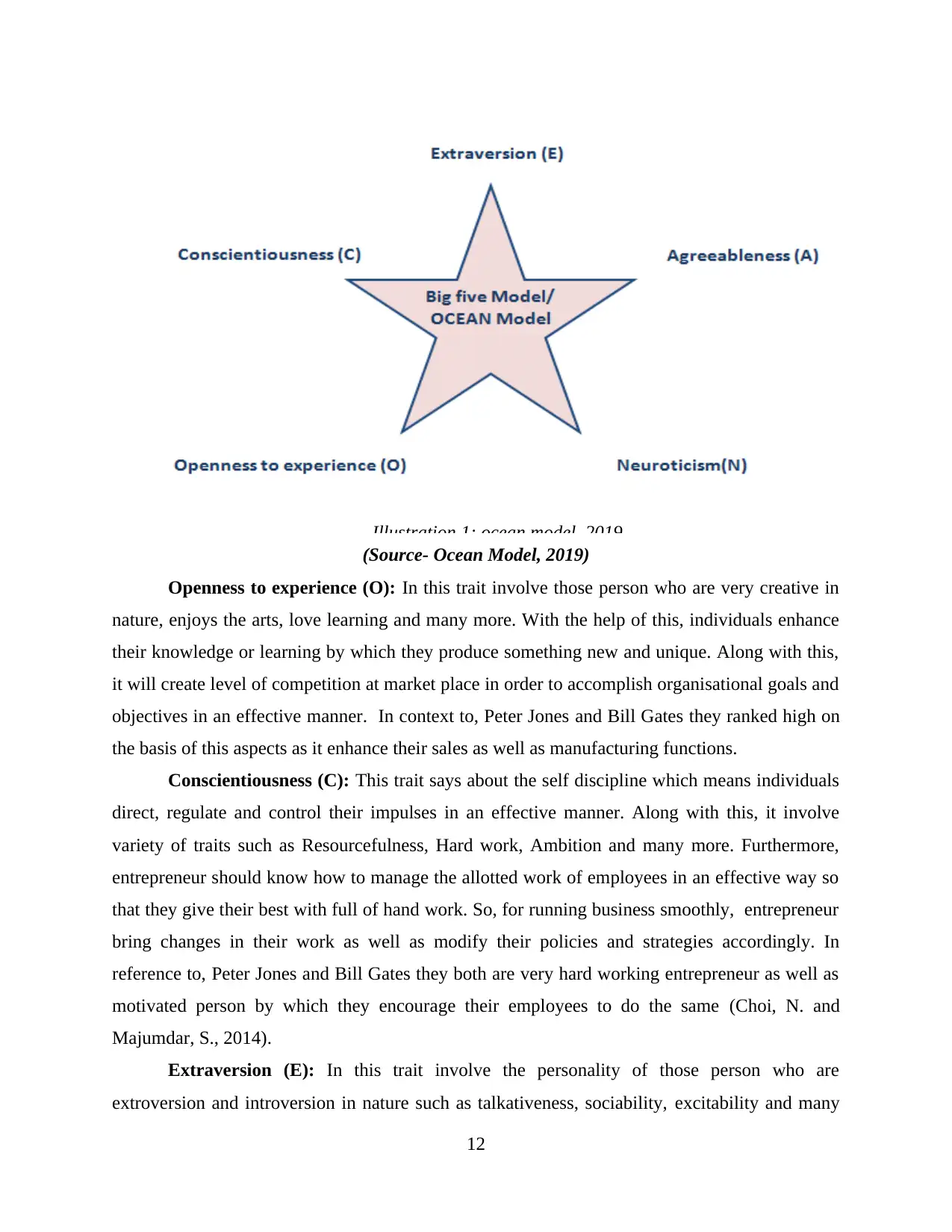
(Source- Ocean Model, 2019)
Openness to experience (O): In this trait involve those person who are very creative in
nature, enjoys the arts, love learning and many more. With the help of this, individuals enhance
their knowledge or learning by which they produce something new and unique. Along with this,
it will create level of competition at market place in order to accomplish organisational goals and
objectives in an effective manner. In context to, Peter Jones and Bill Gates they ranked high on
the basis of this aspects as it enhance their sales as well as manufacturing functions.
Conscientiousness (C): This trait says about the self discipline which means individuals
direct, regulate and control their impulses in an effective manner. Along with this, it involve
variety of traits such as Resourcefulness, Hard work, Ambition and many more. Furthermore,
entrepreneur should know how to manage the allotted work of employees in an effective way so
that they give their best with full of hand work. So, for running business smoothly, entrepreneur
bring changes in their work as well as modify their policies and strategies accordingly. In
reference to, Peter Jones and Bill Gates they both are very hard working entrepreneur as well as
motivated person by which they encourage their employees to do the same (Choi, N. and
Majumdar, S., 2014).
Extraversion (E): In this trait involve the personality of those person who are
extroversion and introversion in nature such as talkativeness, sociability, excitability and many
12
Illustration 1: ocean model, 2019
Openness to experience (O): In this trait involve those person who are very creative in
nature, enjoys the arts, love learning and many more. With the help of this, individuals enhance
their knowledge or learning by which they produce something new and unique. Along with this,
it will create level of competition at market place in order to accomplish organisational goals and
objectives in an effective manner. In context to, Peter Jones and Bill Gates they ranked high on
the basis of this aspects as it enhance their sales as well as manufacturing functions.
Conscientiousness (C): This trait says about the self discipline which means individuals
direct, regulate and control their impulses in an effective manner. Along with this, it involve
variety of traits such as Resourcefulness, Hard work, Ambition and many more. Furthermore,
entrepreneur should know how to manage the allotted work of employees in an effective way so
that they give their best with full of hand work. So, for running business smoothly, entrepreneur
bring changes in their work as well as modify their policies and strategies accordingly. In
reference to, Peter Jones and Bill Gates they both are very hard working entrepreneur as well as
motivated person by which they encourage their employees to do the same (Choi, N. and
Majumdar, S., 2014).
Extraversion (E): In this trait involve the personality of those person who are
extroversion and introversion in nature such as talkativeness, sociability, excitability and many
12
Illustration 1: ocean model, 2019
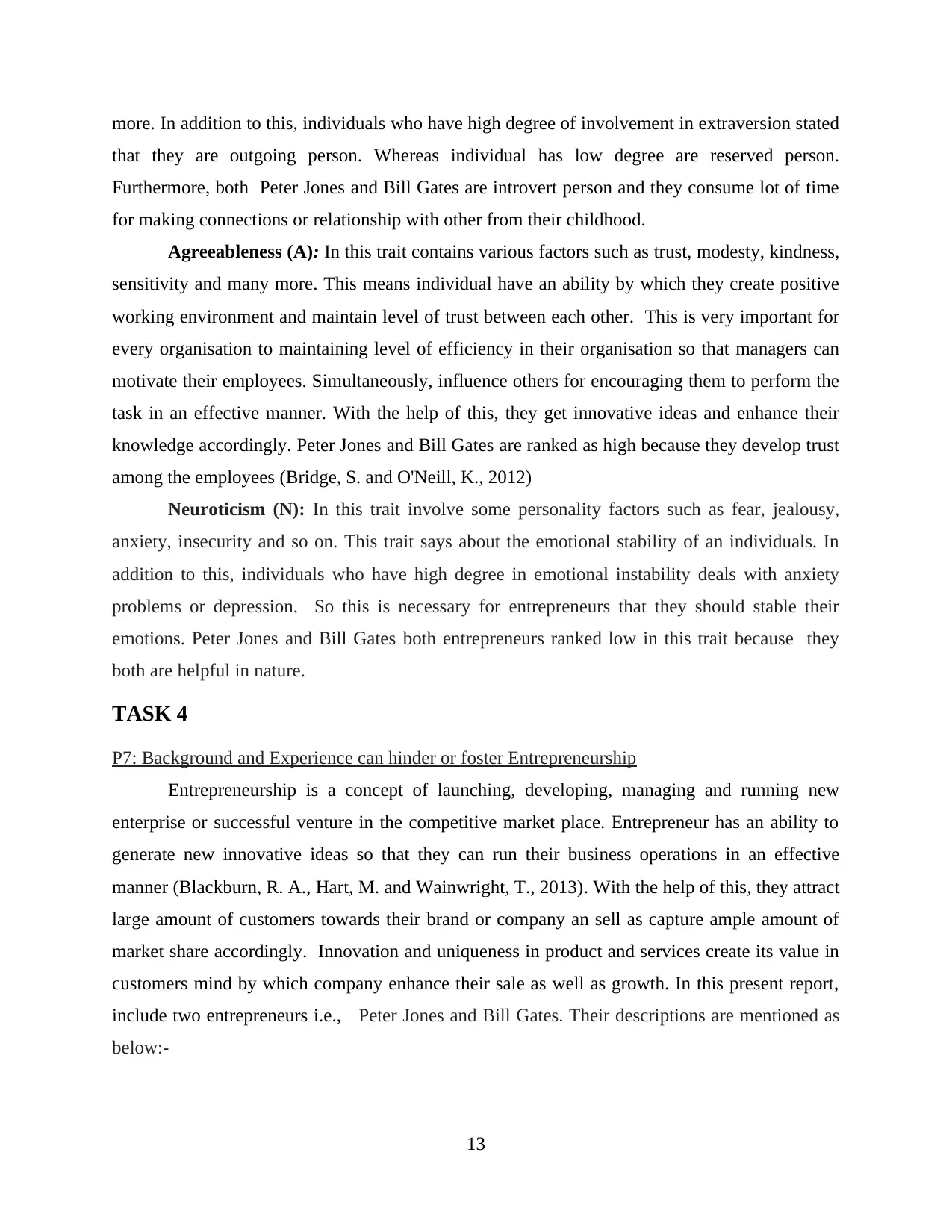
more. In addition to this, individuals who have high degree of involvement in extraversion stated
that they are outgoing person. Whereas individual has low degree are reserved person.
Furthermore, both Peter Jones and Bill Gates are introvert person and they consume lot of time
for making connections or relationship with other from their childhood.
Agreeableness (A): In this trait contains various factors such as trust, modesty, kindness,
sensitivity and many more. This means individual have an ability by which they create positive
working environment and maintain level of trust between each other. This is very important for
every organisation to maintaining level of efficiency in their organisation so that managers can
motivate their employees. Simultaneously, influence others for encouraging them to perform the
task in an effective manner. With the help of this, they get innovative ideas and enhance their
knowledge accordingly. Peter Jones and Bill Gates are ranked as high because they develop trust
among the employees (Bridge, S. and O'Neill, K., 2012)
Neuroticism (N): In this trait involve some personality factors such as fear, jealousy,
anxiety, insecurity and so on. This trait says about the emotional stability of an individuals. In
addition to this, individuals who have high degree in emotional instability deals with anxiety
problems or depression. So this is necessary for entrepreneurs that they should stable their
emotions. Peter Jones and Bill Gates both entrepreneurs ranked low in this trait because they
both are helpful in nature.
TASK 4
P7: Background and Experience can hinder or foster Entrepreneurship
Entrepreneurship is a concept of launching, developing, managing and running new
enterprise or successful venture in the competitive market place. Entrepreneur has an ability to
generate new innovative ideas so that they can run their business operations in an effective
manner (Blackburn, R. A., Hart, M. and Wainwright, T., 2013). With the help of this, they attract
large amount of customers towards their brand or company an sell as capture ample amount of
market share accordingly. Innovation and uniqueness in product and services create its value in
customers mind by which company enhance their sale as well as growth. In this present report,
include two entrepreneurs i.e., Peter Jones and Bill Gates. Their descriptions are mentioned as
below:-
13
that they are outgoing person. Whereas individual has low degree are reserved person.
Furthermore, both Peter Jones and Bill Gates are introvert person and they consume lot of time
for making connections or relationship with other from their childhood.
Agreeableness (A): In this trait contains various factors such as trust, modesty, kindness,
sensitivity and many more. This means individual have an ability by which they create positive
working environment and maintain level of trust between each other. This is very important for
every organisation to maintaining level of efficiency in their organisation so that managers can
motivate their employees. Simultaneously, influence others for encouraging them to perform the
task in an effective manner. With the help of this, they get innovative ideas and enhance their
knowledge accordingly. Peter Jones and Bill Gates are ranked as high because they develop trust
among the employees (Bridge, S. and O'Neill, K., 2012)
Neuroticism (N): In this trait involve some personality factors such as fear, jealousy,
anxiety, insecurity and so on. This trait says about the emotional stability of an individuals. In
addition to this, individuals who have high degree in emotional instability deals with anxiety
problems or depression. So this is necessary for entrepreneurs that they should stable their
emotions. Peter Jones and Bill Gates both entrepreneurs ranked low in this trait because they
both are helpful in nature.
TASK 4
P7: Background and Experience can hinder or foster Entrepreneurship
Entrepreneurship is a concept of launching, developing, managing and running new
enterprise or successful venture in the competitive market place. Entrepreneur has an ability to
generate new innovative ideas so that they can run their business operations in an effective
manner (Blackburn, R. A., Hart, M. and Wainwright, T., 2013). With the help of this, they attract
large amount of customers towards their brand or company an sell as capture ample amount of
market share accordingly. Innovation and uniqueness in product and services create its value in
customers mind by which company enhance their sale as well as growth. In this present report,
include two entrepreneurs i.e., Peter Jones and Bill Gates. Their descriptions are mentioned as
below:-
13
Paraphrase This Document
Need a fresh take? Get an instant paraphrase of this document with our AI Paraphraser
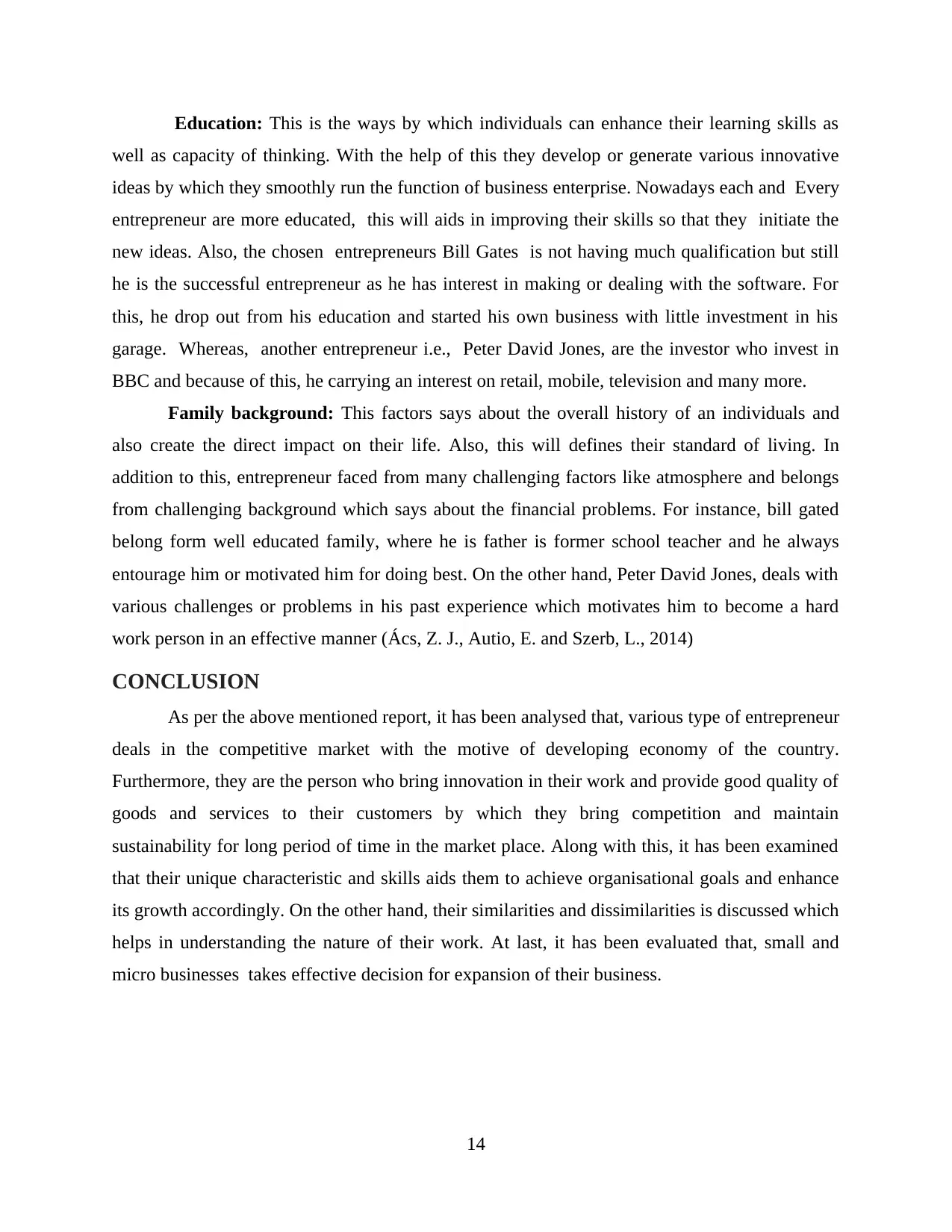
Education: This is the ways by which individuals can enhance their learning skills as
well as capacity of thinking. With the help of this they develop or generate various innovative
ideas by which they smoothly run the function of business enterprise. Nowadays each and Every
entrepreneur are more educated, this will aids in improving their skills so that they initiate the
new ideas. Also, the chosen entrepreneurs Bill Gates is not having much qualification but still
he is the successful entrepreneur as he has interest in making or dealing with the software. For
this, he drop out from his education and started his own business with little investment in his
garage. Whereas, another entrepreneur i.e., Peter David Jones, are the investor who invest in
BBC and because of this, he carrying an interest on retail, mobile, television and many more.
Family background: This factors says about the overall history of an individuals and
also create the direct impact on their life. Also, this will defines their standard of living. In
addition to this, entrepreneur faced from many challenging factors like atmosphere and belongs
from challenging background which says about the financial problems. For instance, bill gated
belong form well educated family, where he is father is former school teacher and he always
entourage him or motivated him for doing best. On the other hand, Peter David Jones, deals with
various challenges or problems in his past experience which motivates him to become a hard
work person in an effective manner (Ács, Z. J., Autio, E. and Szerb, L., 2014)
CONCLUSION
As per the above mentioned report, it has been analysed that, various type of entrepreneur
deals in the competitive market with the motive of developing economy of the country.
Furthermore, they are the person who bring innovation in their work and provide good quality of
goods and services to their customers by which they bring competition and maintain
sustainability for long period of time in the market place. Along with this, it has been examined
that their unique characteristic and skills aids them to achieve organisational goals and enhance
its growth accordingly. On the other hand, their similarities and dissimilarities is discussed which
helps in understanding the nature of their work. At last, it has been evaluated that, small and
micro businesses takes effective decision for expansion of their business.
14
well as capacity of thinking. With the help of this they develop or generate various innovative
ideas by which they smoothly run the function of business enterprise. Nowadays each and Every
entrepreneur are more educated, this will aids in improving their skills so that they initiate the
new ideas. Also, the chosen entrepreneurs Bill Gates is not having much qualification but still
he is the successful entrepreneur as he has interest in making or dealing with the software. For
this, he drop out from his education and started his own business with little investment in his
garage. Whereas, another entrepreneur i.e., Peter David Jones, are the investor who invest in
BBC and because of this, he carrying an interest on retail, mobile, television and many more.
Family background: This factors says about the overall history of an individuals and
also create the direct impact on their life. Also, this will defines their standard of living. In
addition to this, entrepreneur faced from many challenging factors like atmosphere and belongs
from challenging background which says about the financial problems. For instance, bill gated
belong form well educated family, where he is father is former school teacher and he always
entourage him or motivated him for doing best. On the other hand, Peter David Jones, deals with
various challenges or problems in his past experience which motivates him to become a hard
work person in an effective manner (Ács, Z. J., Autio, E. and Szerb, L., 2014)
CONCLUSION
As per the above mentioned report, it has been analysed that, various type of entrepreneur
deals in the competitive market with the motive of developing economy of the country.
Furthermore, they are the person who bring innovation in their work and provide good quality of
goods and services to their customers by which they bring competition and maintain
sustainability for long period of time in the market place. Along with this, it has been examined
that their unique characteristic and skills aids them to achieve organisational goals and enhance
its growth accordingly. On the other hand, their similarities and dissimilarities is discussed which
helps in understanding the nature of their work. At last, it has been evaluated that, small and
micro businesses takes effective decision for expansion of their business.
14
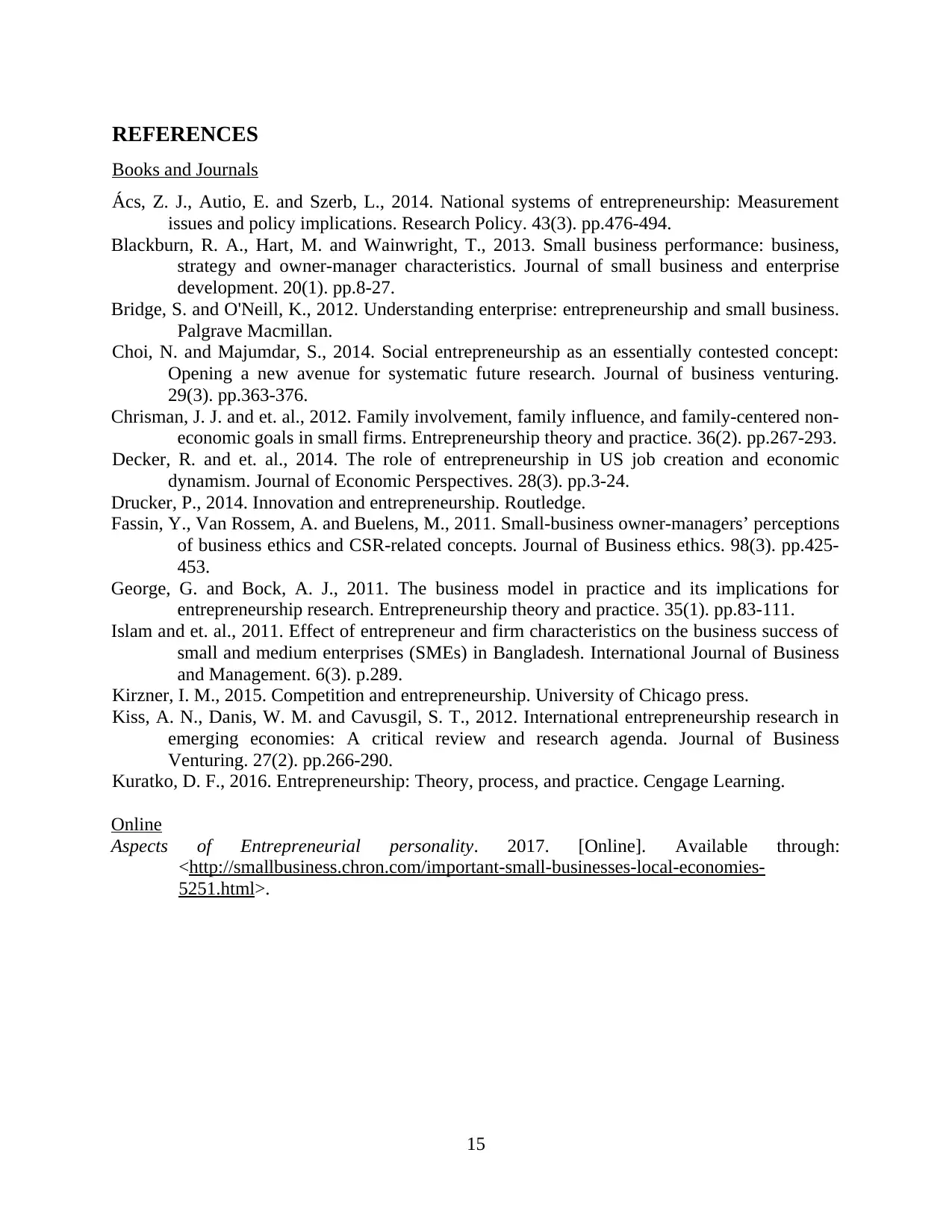
REFERENCES
Books and Journals
Ács, Z. J., Autio, E. and Szerb, L., 2014. National systems of entrepreneurship: Measurement
issues and policy implications. Research Policy. 43(3). pp.476-494.
Blackburn, R. A., Hart, M. and Wainwright, T., 2013. Small business performance: business,
strategy and owner-manager characteristics. Journal of small business and enterprise
development. 20(1). pp.8-27.
Bridge, S. and O'Neill, K., 2012. Understanding enterprise: entrepreneurship and small business.
Palgrave Macmillan.
Choi, N. and Majumdar, S., 2014. Social entrepreneurship as an essentially contested concept:
Opening a new avenue for systematic future research. Journal of business venturing.
29(3). pp.363-376.
Chrisman, J. J. and et. al., 2012. Family involvement, family influence, and family‐centered non‐
economic goals in small firms. Entrepreneurship theory and practice. 36(2). pp.267-293.
Decker, R. and et. al., 2014. The role of entrepreneurship in US job creation and economic
dynamism. Journal of Economic Perspectives. 28(3). pp.3-24.
Drucker, P., 2014. Innovation and entrepreneurship. Routledge.
Fassin, Y., Van Rossem, A. and Buelens, M., 2011. Small-business owner-managers’ perceptions
of business ethics and CSR-related concepts. Journal of Business ethics. 98(3). pp.425-
453.
George, G. and Bock, A. J., 2011. The business model in practice and its implications for
entrepreneurship research. Entrepreneurship theory and practice. 35(1). pp.83-111.
Islam and et. al., 2011. Effect of entrepreneur and firm characteristics on the business success of
small and medium enterprises (SMEs) in Bangladesh. International Journal of Business
and Management. 6(3). p.289.
Kirzner, I. M., 2015. Competition and entrepreneurship. University of Chicago press.
Kiss, A. N., Danis, W. M. and Cavusgil, S. T., 2012. International entrepreneurship research in
emerging economies: A critical review and research agenda. Journal of Business
Venturing. 27(2). pp.266-290.
Kuratko, D. F., 2016. Entrepreneurship: Theory, process, and practice. Cengage Learning.
Online
Aspects of Entrepreneurial personality. 2017. [Online]. Available through:
<http://smallbusiness.chron.com/important-small-businesses-local-economies-
5251.html>.
15
Books and Journals
Ács, Z. J., Autio, E. and Szerb, L., 2014. National systems of entrepreneurship: Measurement
issues and policy implications. Research Policy. 43(3). pp.476-494.
Blackburn, R. A., Hart, M. and Wainwright, T., 2013. Small business performance: business,
strategy and owner-manager characteristics. Journal of small business and enterprise
development. 20(1). pp.8-27.
Bridge, S. and O'Neill, K., 2012. Understanding enterprise: entrepreneurship and small business.
Palgrave Macmillan.
Choi, N. and Majumdar, S., 2014. Social entrepreneurship as an essentially contested concept:
Opening a new avenue for systematic future research. Journal of business venturing.
29(3). pp.363-376.
Chrisman, J. J. and et. al., 2012. Family involvement, family influence, and family‐centered non‐
economic goals in small firms. Entrepreneurship theory and practice. 36(2). pp.267-293.
Decker, R. and et. al., 2014. The role of entrepreneurship in US job creation and economic
dynamism. Journal of Economic Perspectives. 28(3). pp.3-24.
Drucker, P., 2014. Innovation and entrepreneurship. Routledge.
Fassin, Y., Van Rossem, A. and Buelens, M., 2011. Small-business owner-managers’ perceptions
of business ethics and CSR-related concepts. Journal of Business ethics. 98(3). pp.425-
453.
George, G. and Bock, A. J., 2011. The business model in practice and its implications for
entrepreneurship research. Entrepreneurship theory and practice. 35(1). pp.83-111.
Islam and et. al., 2011. Effect of entrepreneur and firm characteristics on the business success of
small and medium enterprises (SMEs) in Bangladesh. International Journal of Business
and Management. 6(3). p.289.
Kirzner, I. M., 2015. Competition and entrepreneurship. University of Chicago press.
Kiss, A. N., Danis, W. M. and Cavusgil, S. T., 2012. International entrepreneurship research in
emerging economies: A critical review and research agenda. Journal of Business
Venturing. 27(2). pp.266-290.
Kuratko, D. F., 2016. Entrepreneurship: Theory, process, and practice. Cengage Learning.
Online
Aspects of Entrepreneurial personality. 2017. [Online]. Available through:
<http://smallbusiness.chron.com/important-small-businesses-local-economies-
5251.html>.
15

16
1 out of 16
Related Documents
Your All-in-One AI-Powered Toolkit for Academic Success.
+13062052269
info@desklib.com
Available 24*7 on WhatsApp / Email
![[object Object]](/_next/static/media/star-bottom.7253800d.svg)
Unlock your academic potential
© 2024 | Zucol Services PVT LTD | All rights reserved.




